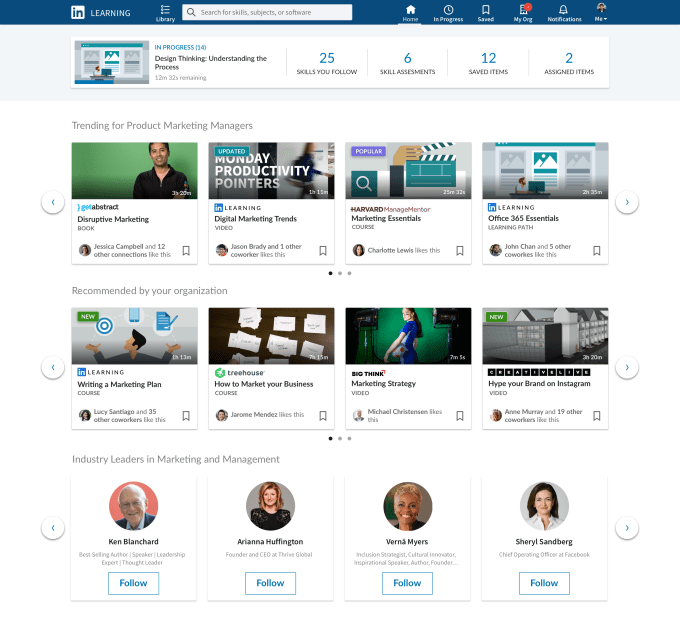LinkedIn Learning now includes 3rd party content and Q&A interactive features
LinkedIn, the Microsoft-owned social network for the working world with some 580 million users, took a big step into professional development and education when it acquired Lynda.com for $1.5 billion and used it as the anchor for LinkedIn Learning. Now, with 13,000 courses on the platform, LinkedIn is announcing two new developments to get more people using the service. It will now offer videos, tutorials and courses from third-parties such as Treehouse and the publishing division of Harvard Business School. And in a social twist, people who use LinkedIn Learning — the students and teachers — will now be able to ask and answer questions around LinkedIn Learning sessions, as well as follow instructors on LinkedIn, and see others’ feedback on courses.
Unlimited access to LinkedIn Learning comes when a person pays for LinkedIn’s Premium Career tier, which costs around $30/month, or when a company takes an enterprise team subscription for the Learning service. Today, LinkedIn tells me that it has around 11,000 enterprise customers; it doesn’t break out how much traffic it has overall on LinkedIn, but says that there has been a 64 percent growth in paid learners since the start of 2017 — a number that it’s clearly looking to boost with these new features.
James Raybould, the director of product for LinkedIn Learning, said that the third-party expansion will come slowly at first, with a handful of partners getting access to integrate with LinkedIn Learning. Over time, this could expand to be a public API for anyone to integrate content, he added, but for now, LinkedIn is doing the curating.
Notably, he also said that LinkedIn itself is not planning on curtailing the amount of content it will continue to produce for Learning: it’s currently adding more than 70 new courses each week on average, he said.

The content in this first wave of third-party providers feels like a natural extension of the influencer-based content that LinkedIn has been running in its main newsfeed: it runs the gamut from actual courses to learn new skills in specific disciplines, to the more nebulous area of professional development.
The first group includes Harvard Business Publishing (e.g. leadership development courses from Harvard Business School’s publishing arm); getAbstract (a Blinkist-style service that provides 10,000+ non-fiction book summaries plus TED talks); Big Think: 500 short-form videos on topics of the day (these are not so much “courses” as they are “life lessons” — subjects include organizing activism and an explainer on how to end bi-partisan politics); Treehouse, with courses on coding and product design skills; and Creative Live, with courses and tutorials for professionals in the creative industries to improve their skills and business acumen.
The fact that LinkedIn is adding more learning material that’s a natural extension of the kind of content it already offers to users in their timelines is not the only parallel between main LinkedIn and LinkedIn Learning. Raybould said that to help users discover content that might be most interesting to them, it uses data about what users browse and click on in the regular site.
“We have rich information about the network, including on engagement,” he said, and that helps LinkedIn’s algorithms suggest what to populate in individual learning libraries.
This is also, presumably, one of the reasons why third-parties will want to integrate: to get new audiences that are more targeted to the kind of content they are producing.
“At Harvard Business Publishing, we work to create the world’s best learning experiences to help organizations discover new ways to solve their most pressing leadership development challenges,” said Rich Gravelin, director of Partnerships and Alliances at Harvard Business Publishing, in a statement. “As an inaugural partner in the LinkedIn Learning Content Partner Program, we are bringing rich leadership development content to professionals across the globe, helping them navigate today’s complex business landscape. Thanks to the robust platform that LinkedIn Learning has built, we’re able to meet learners where they are and provide them with the unique and personalized learning experiences they need to succeed in their organizations.”
The social features also follow this model. Last year, LinkedIn rolled out a mentorship product across selected markets to pair users with people who steer them on their career development. That product set a precedent for how LinkedIn might use its wider social network and communication features to engage users in different ways, in the name of professional development.
The addition of Q&A features follows on from that, giving those taking courses or watching videos a way of interacting and following up with those who are doing the teaching. Adding that it could see more engagement across the whole of the Learning product.
It’s a surprise, in a way, that it’s taken this long for LinkedIn to add an interactive Q&A feature, considering that direct messaging and users interacting with each other has been a cornerstone of the product. On the other hand, it will be interesting to see if it proves to be a compelling enough feature to bring in more users to LinkedIn, luring them away from the Udemys and Skillsofts of the world.
Contributer : Social – TechCrunch
 Reviewed by mimisabreena
on
Sunday, November 11, 2018
Rating:
Reviewed by mimisabreena
on
Sunday, November 11, 2018
Rating:














No comments:
Post a Comment